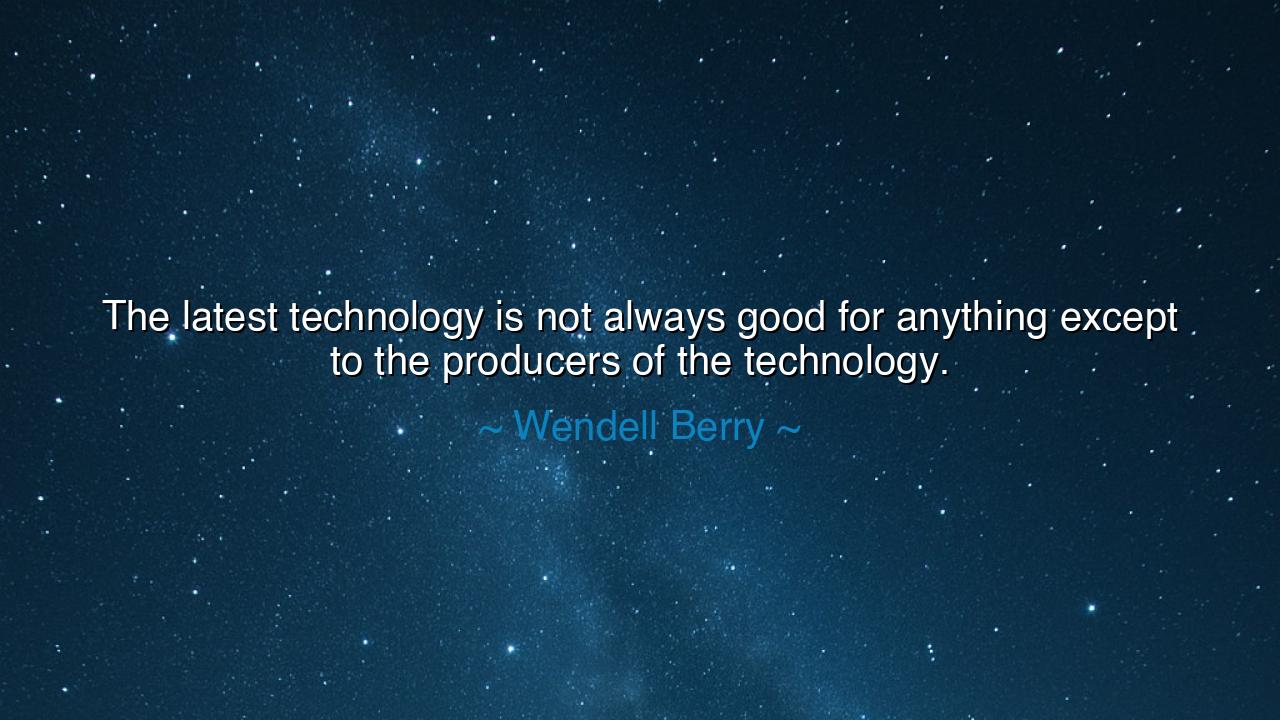
The latest technology is not always good for anything except to
The latest technology is not always good for anything except to the producers of the technology.






Hear, O children of discernment, the words of Wendell Berry, a farmer, poet, and prophet of the land: “The latest technology is not always good for anything except to the producers of the technology.” These words, though simple, pierce like an arrow through the illusions of progress. For the world oft chanteth in praise of the new, bowing before every machine and marvel as though it were salvation itself. But Berry remindeth us: not all that is new is wise, and not all that is advanced is good. Many inventions serve not the people, nor the earth, but only the wealth of those who make them.
Mark well this warning: the hunger for novelty hath long enslaved mankind. In ancient days, kingdoms armed themselves with weapons of bronze, then of iron, not because they sought peace, but because the makers of arms prospered by it. The people bore the burden, while the producers reaped the gain. In our own time, how many devices glitter in shop windows, promising ease, but delivering distraction? How many machines strip the land and poison the soil, enriching the few while impoverishing the earth? Thus do we see the truth of Berry’s words: technology is not virtue; it is a tool, and tools may serve greed as well as good.
Consider the tale of the Industrial Revolution. The latest technologies of steam and mechanized looms transformed cities and nations. Yet while factories grew rich, countless workers—men, women, even children—labored in misery, breathing soot, chained to machines, living short and weary lives. For them, the marvels of progress were no blessing. They were burdens borne upon their bodies, while the wealth of nations flowed to the pockets of the powerful. Only later, through struggle and reform, did society bend those machines toward the service of humanity.
So too in our age of glowing screens and artificial minds. The latest technology promises connection, yet oft breeds isolation. It promises convenience, yet fosters dependence. The farmer who once knew his soil is told he must buy new seeds each year, seeds that serve the profit of their makers more than the nourishment of the people. The worker who once held steady hands is told he is replaceable by automation. Such things reveal that progress without wisdom may benefit the producers, but not the souls of men.
Yet, O seekers, despise not all technology. For it is not evil in itself, but neutral, awaiting the spirit of its master. Fire may burn the village or warm the home. Steel may forge plowshares or swords. The lesson of Berry is not to reject invention, but to question it: to ask who it serves, what it heals, and what it harms. Blind worship of the new is folly; thoughtful use of the new is wisdom.
The lesson is plain: let not the glitter of novelty deceive thee. Before thou embracest the latest technology, ask: does it enrich life, or only the producer? Does it honor the earth, or does it strip her? Does it deepen human connection, or does it sever it? In these questions lieth the measure of true progress. For the path of wisdom is not to seize every tool, but to choose carefully those that nourish both body and spirit.
Practical is this counsel: live not as a servant of every new device. Choose tools that bring balance, not bondage. Support technologies that heal the soil, strengthen communities, and uplift the poor. Resist those that hollow the soul, exhaust the earth, and fatten only the powerful. In this way, you reclaim mastery over your life, and you honor creation itself.
Thus remember Berry’s words: “The latest technology is not always good for anything except to the producers of the technology.” Let not your awe for invention blind you to its cost. For the truest progress is not measured in machines, but in the flourishing of people, the health of the land, and the endurance of wisdom through generations. And if you walk by this measure, your children shall bless your name, saying you chose not only what was new, but what was good.






AAdministratorAdministrator
Welcome, honored guests. Please leave a comment, we will respond soon